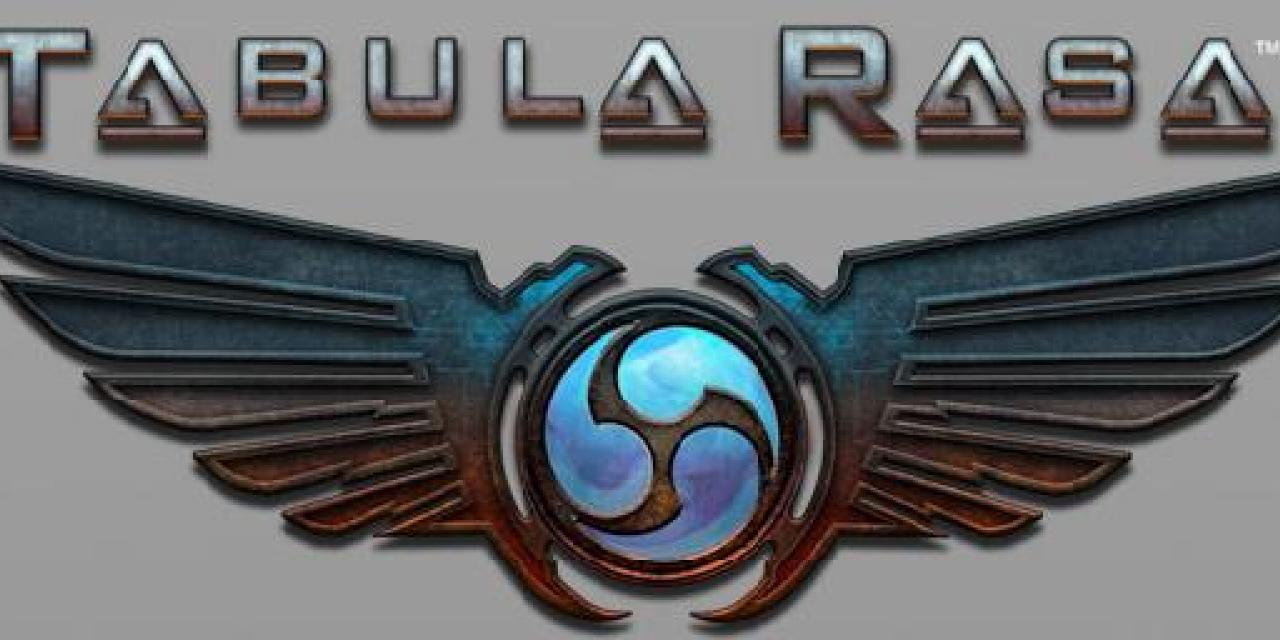
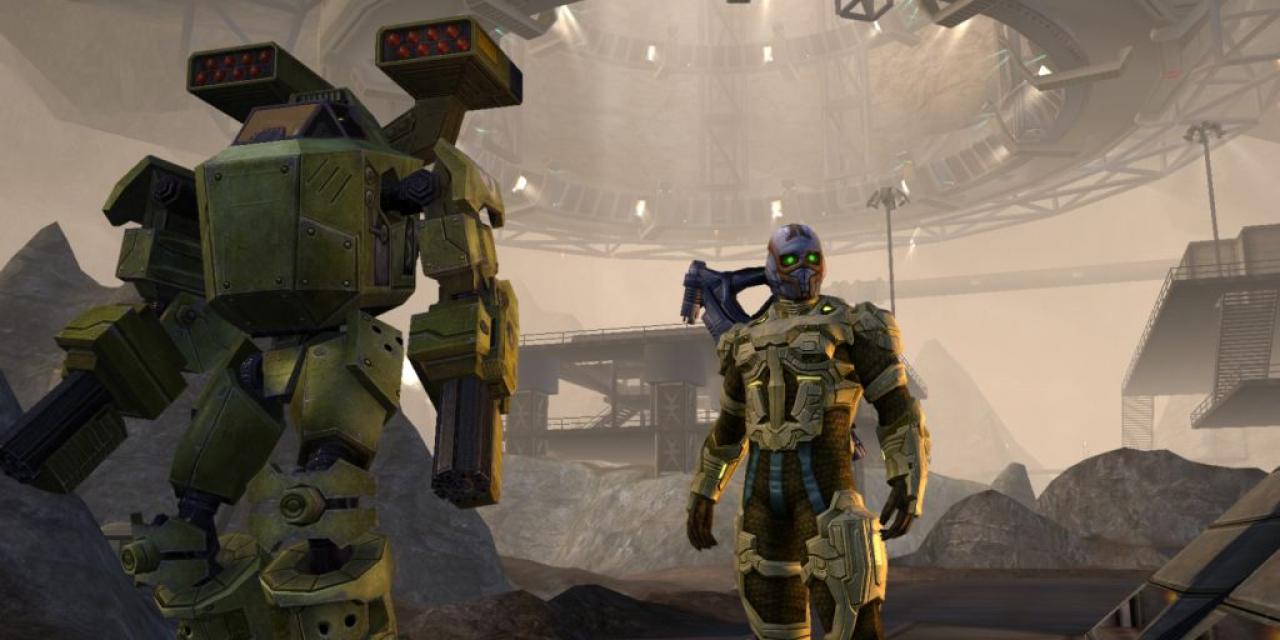
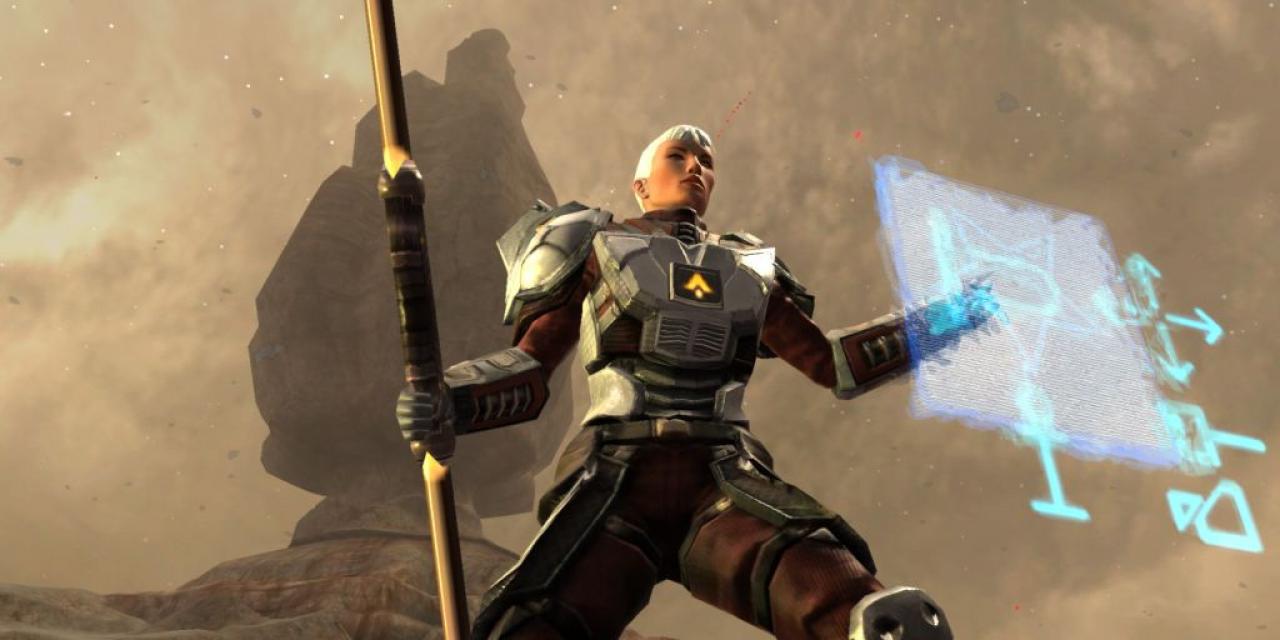
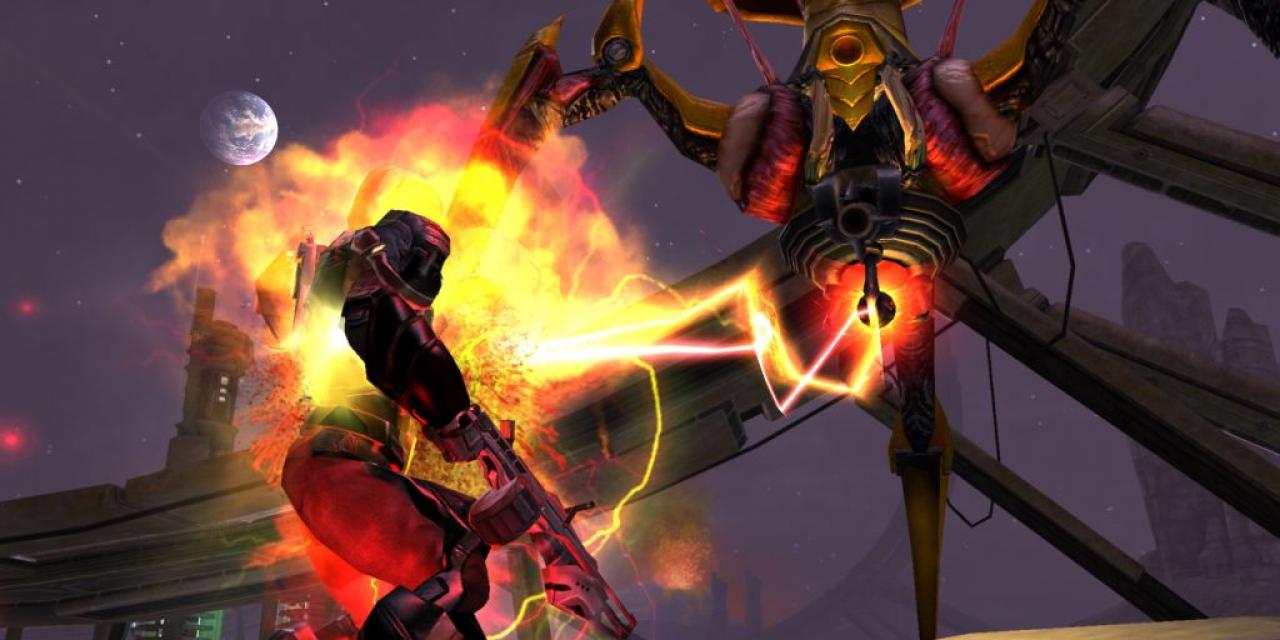
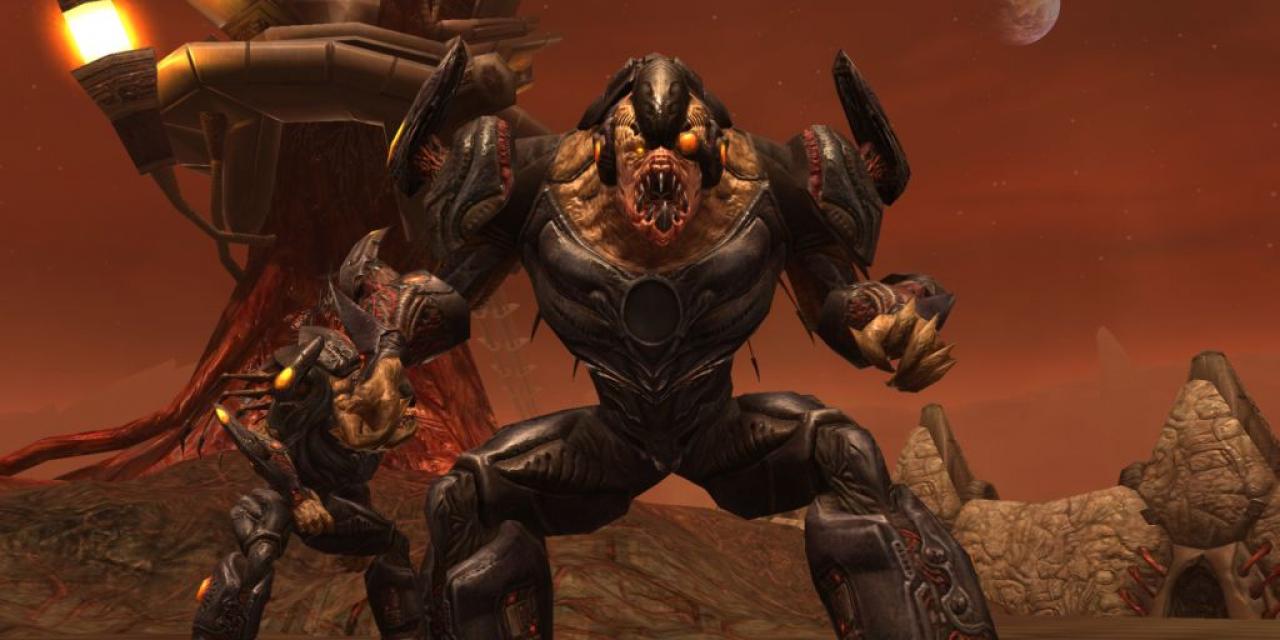

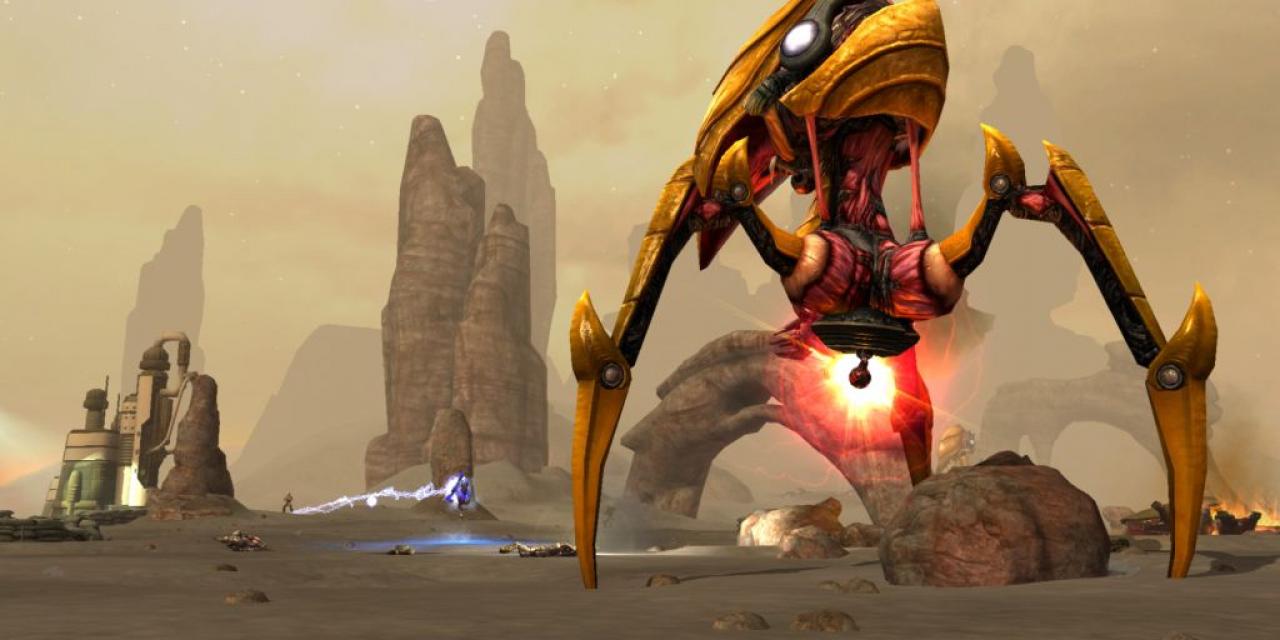
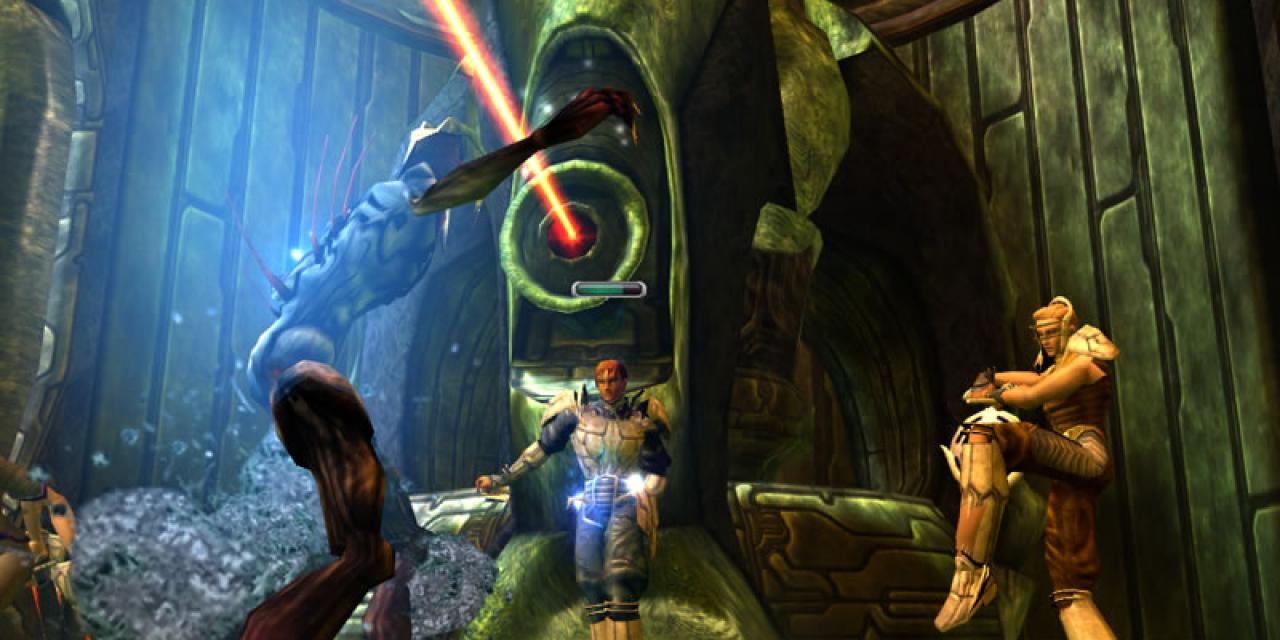
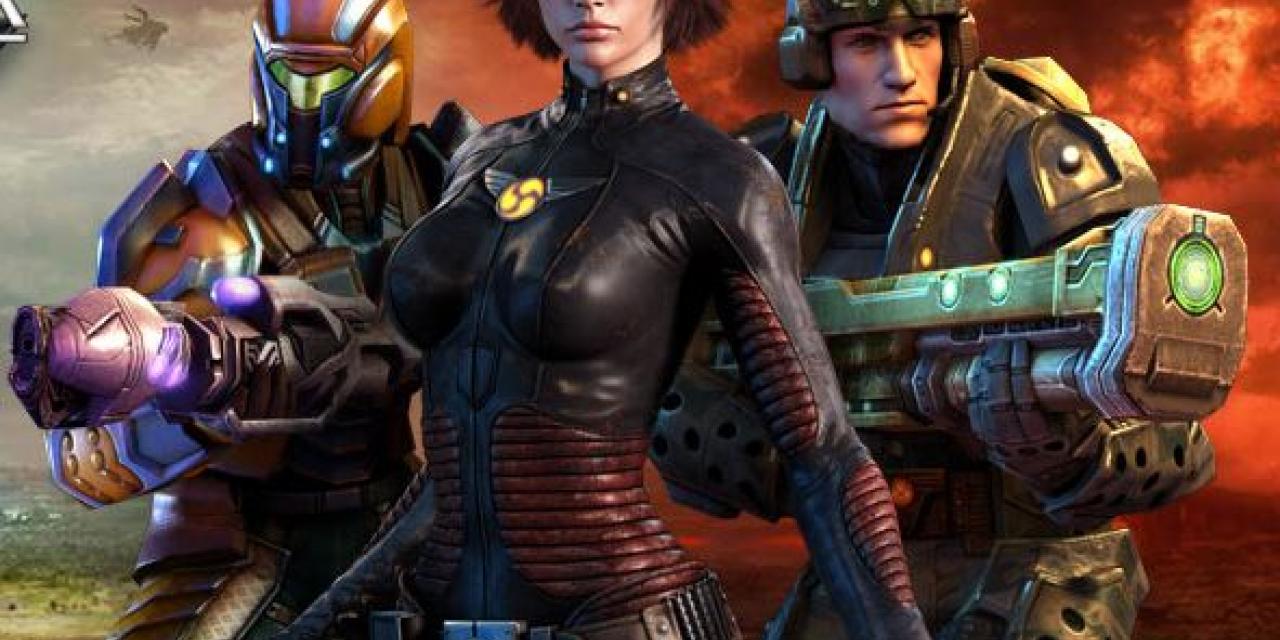
Richard Garriot's "clean slate" goes live in October and MegaGames has got the scoop on everything from the live Beta to the two year time sink that went into the game's original (and scrapped) design. For those of you living under a rock, Richard Garriot is the creator of the Ultima series - the infamous "Lord British" who brought you the pinnacle of fantasy MMO gameplay. With Tabula Rasa, Lord British is looking to side-step his reputation as a king of fantasy, and revamp his image as an MMO innovator. No more orcs, wizards, or ninjas; to hell with the typical lore-hemorrhaged plot. Tabula Rasa is an action sci-fi shooter cross-bred with good old MMO gameplay.
In the months leading up to launch, Lord British has made Tabula Rasa increasingly visible in the public eye, running press events from NCsfot's Austin offices to last month's to a very spiffy-looking playable build at the Penny Arcade Expo last month. This is a relief as the game has been in development for an unspeakably long time, thanks to a false start in the game's design early on. Citing the "took many chefs spoil the broth," attaché, British explains these two years that were tossed out can be blamed on clashing design elements - trying to go for an "east meets west" look led to a hodgepodge of pug-fugly buildings and not much else.
Now all that's in the past and instead we've got a gritty sci-fi epic starring you as the remnants of humanity, cast into a war with the Bane. The story's pretty basic for fans of science fiction literature: mankind gets jumped, chooses genetically superior members of its race to fight back, and all hell breaks loose. Along for this ride are various auxiliary alien races that also want to resist the destruction of the Bane - but since you can't play as one of their ilk, who cares?
"One of the biggest problems MMOs have is that they never immerse you in the world," Garriott said in an interview with Gamespy.com. Garriot aims to bring us the lore of Tabula Rasa in a more basic way than endless screens of text to be scrolled through by throwing in one fancy cutscene (so far) and then throwing you right into a game with minimal fluff between you and the action. "[In most MMOs] You spend most of your time pressing buttons, watching the interface and waiting for a cooldown meter to finish so you can press it again." British is determined to break the mold with his combat system in addition to enhancing the immersive qualities of the game.
The simple story combined with a highly structured character advancement system provides Tabula Rasa with a lot more focus than many other MMOs can boast. Add to that some very nice looking graphics, a gameplay system that really does change the way we play MMOs, and a solid user interface and we just might have the MMO of the year.
But - is the gameplay really that innovative? Does the action element of Tabula Rasa alienate many MMO gamers on principle? Will the outstanding graphics murder your computer more than gratify your gameplay experience? Read on to find out.
The big deal here is the way in which the game allows thousands of players to shoot at each other (and the Bane) in real time. To achieve this fast-paced goal, Destination Games has designed a system that calculates all sorts of factors (are you standing behind cover, is your gun modded with a Logos, what armor does the enemy have, at what speed are they moving, etc.) in a split second to decide if your shot goes wide, their misses, or any sort of status effect occurs when the gun is fired. From what we've seen, this system works fairly well - and we cannot thank them enough for that targeting reticule.
As for the engine, Destination Games has gone its own way and crafted a 3D engine from the ground up. But what do you expect from a studio that's trying to "re-invent" MMOs? Early on, as we mentioned before, the game underwent a redesign to clean up the mishmash that was Tabula Rasa several years ago in its development cycle. This caused 75% of the code to be rewritten to give Tabula Rasa it's neon-futuristic glows and rounded graphical styling. We wish we could say more, but until the game goes live, all we can say is whatever they've done seems to work pretty damn well.
If nothing else, Tabula Rasa looks fantastic - with a GeForce 8600 GT video card, that is (256 MG minimum). The game also requires 1 GB of ram - 2 GBs for Vista users - or it will eat your hard drive alive while trying to load the alien landscapes and fast-moving combat graphics. We really don't recommend playing this game on a laptop or a desktop that's been recently upgraded to Windows Vista. XP should suffice for everyone else - but so far the game looks awfully choppy even on a high-end machine (it's still Beta, though, so nothing is definite).
Right from the character creation screen, Tabula Rasa feels like no other MMO we've played before. Instead of being asked to make all these weighty choices in the space of about ten minutes (and read all the flavor text that goes with each), we've got only the basics: man or woman, blonde or other, and mix-and-match clothing options. In the way of traits, attributes, or what have you, the character development takes place throughout the game as you kill stuff to gain points to put into the physical skills (mind, body, spirit) or into abilities that basically work as stat buffs or magic spells (sprint, marksmanship, lighting).
Let's talk about Logos for a second. It's no secret that Richard Garriot is heavily into lore-building (what with his Felucca and Trammel plot twist for Ultima Online) - but it looks like Lord British is aiming to be the next J.R.R. Tolkien. That's right: old LB has gone and invented his own language on which the entire "magic" system of Tabula Rasa is based. Logos are these shiny alien symbols spread throughout the galaxy. The symbols each represent a different element or aspect (such as power or time) and grant the user various new abilities (like that lighting we mentioned earlier). Logos can also be bound to weapons to increase or change their effects, but watch out; a bad Logos binding can ruin some of your nicest gear. Because the Logos scattered everywhere (and the strongest ones are the hardest to find) Tabula Rasa takes on a collection aspect more commonly associated with Pokemon. And if that doesn't sound fun enough, Garriot has also said that the Logos will spell out a secret message which reveals a bit more of the back story - but only if you go out and find them all.
At some point during your leveling, you have to make choices about what skills you want to pursue. The first major branch is the most basic: soldier or specialist. The former is what it sounds like: brawlers and fighters, melee and ranged. The second is a catch-all for what would be your standard Priest or Mage in fantasy MMOs: stat-buffers, healers, etc. Beyond that main fork, you hone your specialties past the point of no return (Sapper& Biotechnician or Ranger & Commando, and so forth) . Luckily, Tabula Rasa has a "clone" system that allows you to copy your character at their current level and specialty pool so that you can go back and branch out in a completely different direction for an all-new character (without having to start way back at the beginning).
Combat goes by fast - a la Halo-style shoot-'em ups. Unlike other MMOs, Rasa allows you to use the environment as cover from enemy fire, letting you crouch behind shrapnel or tree stumps while you take aim and fire with your weapon or your Logos-powered "spell". A targeting mechanism is a bit of a cop-out for you hardcore shooter fans, but for the rest of us, it's common sense as we flail around for cover when a Bane drop ship deposits a clutch of the brutes right on top of you. The only downside is the need to constantly reload your weapon or wait for your adrenaline gauge to refill so that you can use your abilities. Not reloading leads to your gun jamming which can only be corrected by reloading the gun - and you can mash on that "cast" button until your fingers turn blue, and nothing will happen until the adrenaline meter refills over time. So, recall if you will, Lord British's statements about "whack-a-mole" gameplay and ask yourself if this is really that different.
The environment is meant to be a persistent, ever-changing arena where events that occur are permanent - except death, that is. A great deal has also been made about the "moral ramifications" attached to Tabula Rasa quests. Garriot and many other gaming critics lament the fact that MMOs seem to be made up of fetch quests and simple "go talk to so-and-so" errands that win you armor and items only slightly better than what you already have. Supposedly, Tabula Rasa will offer quests where choosing one action over another will weigh on your conscience and lead to various consequences that affect gameplay from that point forward. So far, we haven't seen much of that in Beta - and when we think about it, what can an MMO really do to make a player invest in the game's story to the point where they care about the morality of one choice over another?
What Tabula Rasa can make us care about is PvP, given the time. A shooter cannot exist without at least some form or multiplayer death match - but many MMO fans think MMOs are better off without it. PvP in this little hybrid is designed to be consensual - dueling and so forth - with clan or squad battles and various other specifics to be hammered out prior to the game's release. With a solid gameplay base to work with, PvP fans have reason to be hopeful that Tabula Rasa has something to offer.
Oh, how we ache for the next big thing in MMOs. It's the never-ending grail quest for players and developers alike to hit that sweet spot with gamers (hardcore and casual) that keeps them coming back for more. With a name like Richard Garriot attached to a project and a record of moderate success with other games beneath the developer's belt, it's hard to imagine anything less than an awesome game coming forth from such genius. At the very least, we know we won't be looking at another World of Warcraft clone.
But have they bitten off more than they can chew? It's still early days for Tabula Rasa, and a lot can go wrong with everything that seems to be going so right. The high-end graphics might cripple your computer, the real-time shooting might alienate more traditional gamers who like the slower "more strategic" feel of combat; and if they cannot pull off that "morality" shtick, one fetch-quest will seem very much like another even if it all looks great.
Pros:
+ Graphics
+Music
+Clone system allows you to copy your character at their current level and specialty pool
Cons:
-Sloppy quest organization has you running all over the map instead of staying in one area
-High-end graphics murders your computer, even if it is totally boss
-Reloading your gun feels almost as tedious as waiting for your spells to recharge - so what's the freaking difference?
Wait and See:
+/-Lag on teleporters; there's a lot of ground to cover in this game and it'll be that much more tedious if the teleporters drag ass
+/-"Moral ramifications" of quests; really, how can a fetch quest present us with a quandary we care about?
+/- PvP; it's not too soon for Destination Games to leave PvP gamers out in the cold

